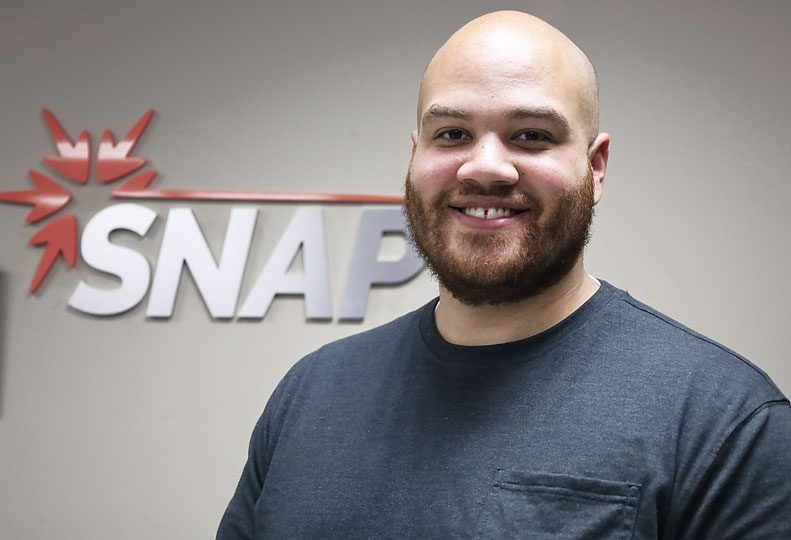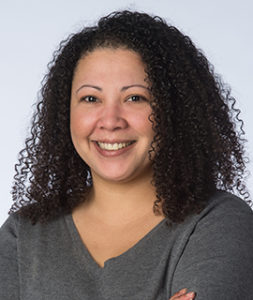
Demand for SNAP Financial Access services surges
For many, nonprofit gives assistance crucial for viability

P.J. Ellis, lead business lender at SNAP Financial Access, says the nonprofit's business loans typically range between $500 and $250,000.
| Erica BullockSNAP Financial Access, a community development financial institution, is experiencing a surge in demand from small businesses for financial assistance and guidance.
Karen Campbell, director of financial stability at the Spokane-based nonprofit, says individual loan amounts are growing higher than ever, and there's a strong demand specifically for technical writing for grant applications.
In 2024, the organization distributed about $1.1 million to 14 business clients, a different dynamic compared with a decade ago, when SNAP made 34 business loans totaling about $627,000 in 2015.
SNAP Financial Access serves an average of 450 clients per year by providing business development training and loans. About 9,000 clients have received about $17 million in small business financing since the financial institution was established in 2005.
The strong demand for assistance from SNAP Financial Access is a culmination of the nonprofit's work over the past two decades, which is focused on financial literacy, education, and loan programs that support small business growth, especially underserved entrepreneurs who may face barriers accessing traditional funding opportunities, she says.
The organization is committed to helping small businesses and entrepreneurs overcome funding rejections from other financial institutions, fulfill market opportunities, finance essential business equipment, and navigate the complexities of starting a business as an immigrant.
"A huge percentage, better than the national average, remain viable because we offered free or reduced-cost training and coaching and lent to them when they were turned down elsewhere," Campbell says of SNAP's small business clients.
P.J. Ellis, lead business lender at SNAP Financial Access, says business loans typically range between $500 and $250,000. Loans under $25,000 are reviewed internally by the organization, while loans over $25,000 are approved through an external loan committee made up of a variety of business professionals in the community, he explains.
Ellis also helps clients with the creation of business proposals, provides business coaching, and offers financial information analysis for clients. He is the only business lender currently employed by SNAP.
The current strong demand can be a lot to manage alone, however Ellis says it hasn't stopped SNAP from taking on new clients and supporting a variety of market ventures.
Cassie Cleary, owner of Spokane-based Honest in Ivory, says she found support through SNAP after being rejected by nine other lenders. Cleary received a $92,000 small business loan to launch a bridal gown retail store, which was a risk for both her and the nonprofit, she says.
In addition to the loan, Cleary says, SNAP's practical approach to business education has helped shape her into a successful entrepreneur, with the knowledge to make realistic decisions and projections for her business, she says.
"I think everyone goes in with rose-colored glasses ... but in a worst case scenario, what could happen?" Cleary says. "They really walked me through what those really hard steps would be ... knowing there's a seasonality to my business. I really appreciated that."
At Spokane-based Lego trade and resale company Brick Buy Brick, co-owner Frankie Foote says SNAP's financial assistance made a significant impact on the retailer's business success.
A little over two years ago, Foote and co-owner Bryce Colvin were putting together a business plan with help from SCORE Spokane, a business consulting and mentorship nonprofit, to help launch their idea to create a place where fans of the popular Lego toy could build a community in Eastern Washington, she explains.
Foote and Colvin were referred to SNAP by SCORE Spokane in 2022 when it was time to finance the new venture. After a little more effort to learn about retail-specific business practices through SNAP, Brick Buy Brick received a $5,000 microloan and a $20,000 small business loan from the organization.
SNAP's financing helped Brick Buy Brick open ahead of schedule, which was important to capture a new market opportunity ahead of a corporate Lego store that was eyeing a new location in downtown Spokane around the same time, Foote explains.
SNAP's business lenders understood the need to open Brick Buy Brick first in order to capture a growing interest for the product in the community, Foote says.
"We wanted to be the first Lego retailer in Spokane," says Foote. "We were worried that if the corporate store beat us, then there would be less excitement around ours."
Brick Buy Brick's mission involves increased accessibility for fans of the product, which can become an expensive hobby for some. Their mission aligns with SNAP's, which includes supporting accessibility in business in underserved communities and industries.
Colvin and Foote have since paid off the $5,000 microloan and expect to pay off their $20,000 small business loan in July, which will be a satisfying accomplishment, Foote says.
"Having somebody else who believes in you is so incredibly helpful when you feel like you're drowning," Foote says of SNAP's support. "Then it all works out and it's great. Having that backup, that support from these professionals, it feels like I'm on the right track."
Many of SNAP's small business clients concede that opening or expanding their companies without the organization's financial and educational assistance would have been difficult, if not altogether impossible.
Igor Anisimov, who co-owns Spokane-based Cedar Coffee with is wife, Irina, says he was attending language lessons as a Ukrainian immigrant and had dreams of starting a business when he first learned of SNAP's business resources. The Anisimovs established Cedar Coffee eight years ago with a $70,000 small business loan from SNAP Financial Access, which was paid off in about four years, he explains.
The business is located at 701 N. Monroe, about a block north of My Fresh Basket in Spokane's Kendall Yards neighborhood.
SNAP helped Anisimov learn about the fundamentals of operating a business including legal entity registration.
"They guided me all the way through, which I'm very thankful for," says Anisimov.
Ellis notes that SNAP places great importance on financing appropriately sized loans.
"We're trying to basically right-size loans for clients while making sure they have enough to get their business started," Ellis says. "We don't want our loans to put people in a negative position."
Spokane Valley-based Magic Souls LLC, a family-owned embroidery business, came to SNAP through the nonprofit's housing assistance program and chose to work with the organization to expand capacity at the company.
Magic Souls co-owners Angelica Zuniga Lara, her son Jorge Carlos Estrada, and her nephew Alejandro Sanchez Zuniga, opened the business in August 2023 as a way to better their family's future while showcasing an aspect of Mexican culture through embroidered clothing, the three co-owners say.
As a home-based business, Magic Souls turned to SNAP after missing out on a few opportunities to embroider uniforms for some larger clients. SNAP provided a $25,000 loan to purchase a large embroidery machine as well as computer equipment and software to help with digital design.
Overall, working with SNAP has been a pleasant and helpful experience, the owners say.
"If we hadn't taken that first step with SNAP, we probably wouldn't be where we are right now," says Zuniga. "SNAP makes Spokane more friendly for beginners in business."
Balancing needs and affordability goes hand-in-hand with the business coaching element, Ellis explains.
"Some clients come in loan-ready and some might not even have a (business) license yet," says Ellis, adding that SNAP's clients typically can receive business financing within three to four weeks, or it could take about six months to receive a loan.
"We take the time needed via our programs to train and coach our clients to help them become qualified borrowers," Campbell says. "Part of that successful formula involves post-loan support as well."
SNAP Financial Access operates under the broader Spokane Neighborhood Action Partners organization, which provides energy and housing assistance to low-income individuals in Spokane County.
SNAP's budget of $37 million in 2025 is derived from a variety of funding sources, including federal programs, foundations, service fees, corporations, city and state funds, and loan interest payments.
"We have plenty of capital onboard to meet local needs, we intend to continue to lend wisely and responsibly to our target markets consisting of low-income and census tract qualified borrowers without interruption as long as our programmatic funds remain in play," says Campbell.
The organization has offices at 3102 W. Whistalks Way, in west Spokane; at the Martin Luther King Jr. Family Outreach Center, at 500 S. Stone, in East Central Spokane; at 4001 N. Cook, inside the Northeast Community Center; at 212 W. Second, in downtown Spokane; and at 10814 E. Broadway, in Spokane Valley.





